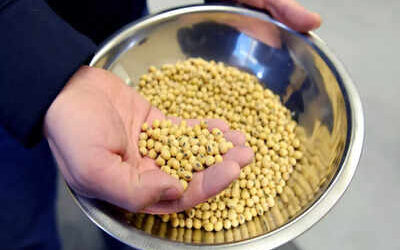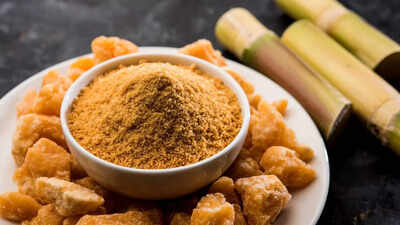How a simple mix of jaggery and warm water can help cleanse your lungs in polluted cities |

As air pollution continues to intensify across India, respiratory health has emerged as a pressing national concern. The thick winter smog that blankets Delhi, Lucknow, and other major cities each year leaves air quality indices oscillating between “very poor” and “severe.” Fine particulate matter (PM2.5) and nitrogen oxides infiltrate deep into the lungs, triggering cough, breathlessness, and long-term respiratory damage. Amid this environmental crisis, many have begun revisiting traditional practices that once supported lung health. One such simple and accessible remedy, consuming jaggery with warm water, has regained public and scientific attention for its potential to naturally assist the body’s cleansing mechanisms.
What makes jaggery a natural lung cleanser
Jaggery, or gur, is an unrefined sugar produced from sugarcane or palm sap. Unlike refined sugar, it retains a variety of minerals such as iron, calcium, magnesium, and trace antioxidants that play a role in supporting metabolism and immune defence. In Ayurvedic traditions, jaggery has long been recommended for purifying the blood, easing throat irritation, and helping expel toxins from the respiratory tract. When paired with warm water, it acts as a mild expectorant, aiding the loosening and expulsion of mucus from the airways, especially useful for individuals exposed to pollution or smoke.
Modern nutritional studies suggest that jaggery supports the body’s mucociliary clearance process, a key respiratory defence mechanism that helps trap and remove pollutants, dust, and allergens from the lungs. By promoting mucus formation and supporting lymphatic movement, jaggery enhances the body’s ability to flush out inhaled irritants. Though it cannot substitute medical treatment, its bioactive properties make it a valuable adjunct for those seeking natural ways to strengthen respiratory health in polluted environments.
How research confirms jaggery’s role in cleansing dust from lungs
A study by the Industrial Toxicology Research Centre, Lucknow, explored why industrial workers in smoky or dusty conditions often reported fewer respiratory complaints when they regularly consumed jaggery. The researchers tested this observation in laboratory rats exposed to coal dust and found that those given jaggery showed better clearance of dust particles from the lungs and lymph nodes compared with untreated animals. The study also revealed that jaggery reduced lung tissue damage and fibrosis, helping preserve the organ’s natural elasticity.The findings suggested that jaggery enhanced mucociliary clearance, the body’s mechanism for removing inhaled pollutants, by increasing sialic acid in mucus. This compound carries a negative charge that attracts and traps positively charged dust and smoke particles, enabling their faster removal from the respiratory tract. Jaggery-fed rats also exhibited higher immune cell activity in tracheobronchial lymph nodes, indicating stronger respiratory defence. These results reinforced ancient Ayurvedic claims, revealing a scientific basis for jaggery’s protective role against airborne toxins.
The right way to drink jaggery with warm water for lung health
Dissolve a small piece of organic jaggery, roughly the size of a teaspoon, in one glass of warm (not boiling) water. Stir until fully melted and drink immediately.Take the drink on an empty stomach in the morning to support detoxification, or after exposure to polluted air to help soothe the throat and clear airways.A pinch of turmeric or black pepper can be included to enhance the drink’s antioxidant and anti-inflammatory effects.Consuming this mixture two to three times a week is ideal during high-pollution periods. Overconsumption should be avoided due to jaggery’s natural sugar content.Individuals with diabetes or metabolic conditions should consult a doctor or dietitian before regular intake, as jaggery can raise blood sugar levels.
- Hydration and lung health:
The warm water keeps mucous membranes moist, while jaggery supports mucus secretion and toxin clearance, helping the lungs stay hydrated and resilient against pollution.
How ancient remedies like jaggery fit into modern lung health routines
The growing interest in home-based respiratory remedies reflects a broader awareness of preventive health amid rising pollution. In India’s urban and industrial regions, where smog is now a seasonal occurrence, integrating such traditional methods offers an accessible and sustainable way to complement medical care. The cultural familiarity of jaggery, combined with emerging evidence of its lung-protective properties, bridges traditional wisdom and contemporary environmental science.While lifestyle changes such as reducing outdoor exposure, using air purifiers, and wearing protective masks remain essential, incorporating simple dietary habits can provide additional support. The jaggery-with-warm-water routine embodies a gentle approach to detoxification, aligning with both ancient Ayurvedic thought and modern health understanding.As air pollution continues to challenge public health systems, revisiting natural, culturally rooted remedies like this encourages individuals to participate actively in their well-being. It offers a practical reminder that some of the most effective health-supporting practices require no complex formulations, only consistent awareness and respect for the body’s innate ability to heal.Disclaimer: This article is for informational purposes only and should not be considered medical advice. Please consult a healthcare professional before making any changes to your diet, medication, or lifestyle.Also Read | How to keep avocados fresh: Simple ways to make them last longer at home






